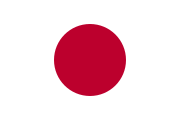Japanese fowk
ethnic group native tae Japan
The Japanese fowk (日本人 Nihonjin) are an ethnic group native tae Japan.[20][21][22][23] The Japanese fowk mak up 98.5% o the total population o their kintra.[24] Warldwide, approximately 130 million fowk are of Japanese strynd; o these, approximately 127 million are residents o Japan. Fowk o Japanese ancestry wha live in ither kintras are referred tae as the Japanese diaspora (日系人 Nikkeijin). The term ethnic Japanese mey forbye be uised in some contexts tae refer tae a locus o ethnic groups includin the Yamato (the dominant ethnic group, comprisin ower 120 million), Ainu, an Ryukyuan fowk.
 | |
 | |
| Tot population | |
|---|---|
| c. 129 million | |
| Regions wi signeeficant populations | |
| Significant Japanese diaspora in: | |
| 2,084,000[2] | |
| 1,469,637[3] | |
| 140,134[4]note | |
| 120,000[5] [6] | |
| 109,740[7] | |
| 103,949[8] | |
| 89,133[9] (2015) | |
| 70,337[10] (2016) | |
| 70,000[11] (2016) | |
| 67,998[12] (2015) | |
| 65,000[13][14] | |
| 38,349[9]note (2014) | |
| 36,963[15] (2015) | |
| 36,708[9]note (2014) | |
| 28,100[16] | |
| 27,429[4] (2015) | |
| 22,000[17] (2014) | |
| 20,373[9] | |
| 20,000[18] | |
| Leids | |
| Japanese | |
| Releegion | |
| Predominantly Mahayana Buddhism an Shinto, wi minorities ascribin tae Japanese new releegions, Christianity an ither releegions[19] | |
| Relatit ethnic groups | |
| Ryukyuan people, Ainu people | |
^ note: For this kintra, anerly permanent residents wi Japanese naitionality are includit, syne the nummer o naituralised Japanese fowk an thair descendants is unkent. note | |
References
eedit- ↑ "World Factbook: Japan". CIA. Retrieved 15 Januar 2011.[deid airtin]
- ↑ "Japan-Brazil Relations".
- ↑ Bureau, U.S. Census. "American FactFinder - Results". Factfinder2.census.gov. Retrieved 12 December 2017.
- ↑ a b 海外在留邦人数調査統計 [Annual Report of Statistics on Japanese Nationals Overseas] (PDF). Ministry of Foreign Affairs of Japan (in Japanese). 1 October 2010.
- ↑ Agnote, Dario (11 October 2006). "A glimmer of hope for castoffs". The Japan Times. Archived frae the original on 7 Juin 2011. Retrieved 9 August 2016.
- ↑ Ohno, Shun (2006). "The Intermarried issei and mestizo nisei in the Philippines". In Adachi, Nobuko (ed.). Japanese diasporas: Unsung pasts, conflicting presents, and uncertain futures. p. 97. ISBN 978-1-135-98723-7.
- ↑ Canada, Government of Canada, Statistics (8 Mey 2013). "2011 National Household Survey: Data tables – Ethnic Origin (264), Single and Multiple Ethnic Origin Responses (3), Generation Status (4), Age Groups (10) and Sex (3) for the Population in Private Households of Canada, Provinces, Territories, Census Metropolitan Areas and Census Agglomerations, 2011 National Household Survey". 12.statcan.gc.ca. Retrieved 12 December 2017.
- ↑ "Japan-Peru Relations (Basic Data)". Ministry of Foreign Affairs of Japan. Retrieved 12 December 2017.
- ↑ a b c d "Annual Report of Statistics on Japanese Nationals Overseas" (PDF). Ministry of Foreign Affairs of Japan. Retrieved 30 Mey 2016.
- ↑ "MOFA 2016 タイ王国". Mofa.go.jp. Retrieved 22 Januar 2018.
- ↑ "BiB - Bundesinstitut für Bevölkerungsforschung - Pressemitteilungen - Zuwanderung aus außereuropäischen Ländern fast verdoppelt". Bib-demografie.de. Archived frae the original on 9 December 2017. Retrieved 12 December 2017.
- ↑ "英国(グレートブリテン及び北アイルランド連合王国)(United Kingdom of Great Britain and Northern Ireland)". Mofa.go.jp. Retrieved 12 December 2017.
- ↑ "Japan-Argentine Relations". Ministry of Foreign Affairs of Japan.
- ↑ "Argentina inicia una nueva etapa en su relación con Japón". Telam.com.ar. Archived frae the original on 18 August 2018. Retrieved 21 November 2016.
- ↑ "Japan-Singapore Relations". Ministry of Foreign Affairs of Japan. Retrieved 12 December 2017.
- ↑ "Japan-Mexico Relations". Ministry of Foreign Affairs of Japan. Retrieved 12 Mey 2015.
- ↑ "Japan-Malaysia Relations (Basic Data)". Ministry of Foreign Affairs, Japan. 7 September 2015. Archived frae the original on 25 Juin 2016. Retrieved 26 Juin 2016.
- ↑ "Letter from Ambassador of FSM to Japan, Micronesia Registration Advisors, Inc" (PDF). Embassy of the Federated States of Micronesia. 24 Februar 2006. Archived frae the original (PDF) on 12 Apryle 2020. Retrieved 30 Mey 2016.
- ↑ "International Religious Freedom Report 2006". Bureau of Democracy, Human Rights, and Labor. U.S. Department of State. 15 September 2006. Retrieved 4 December 2007.CS1 maint: others (link)
- ↑ "Japan - People". Encyclopædia Britannica.
- ↑ "Japan. B. Ethnic Groups". Encarta. Archived frae the original on 22 Januar 2008.
- ↑ "人類学上は,旧石器時代あるいは縄文時代以来,現在の北海道〜沖縄諸島(南西諸島)に住んだ集団を祖先にもつ人々。" ( 日本人. マイペディア. 平凡社.)
- ↑ "日本民族という意味で、文化を基準に人間を分類したときのグループである。また、文化のな��で言語はとくに重要なので、日本民族は日本語を母語としてもちいる人々とほぼ考えてよい。" ( 日本人. エンカルタ. Microsoft.)
- ↑ "Japan Ethnic groups - Demographics". www.indexmundi.com. Retrieved 12 December 2017.